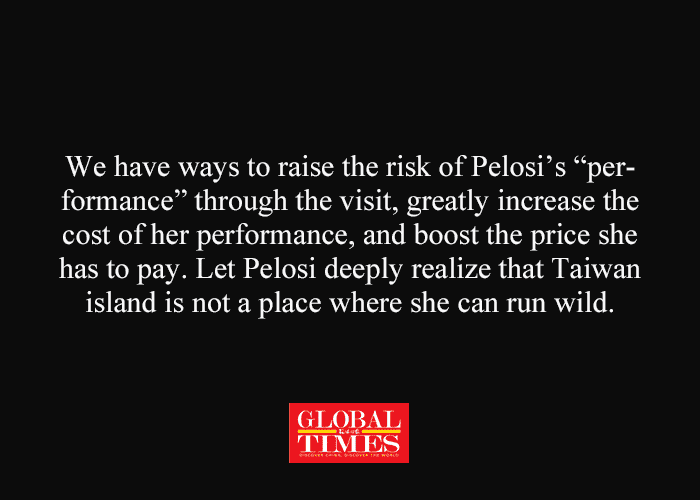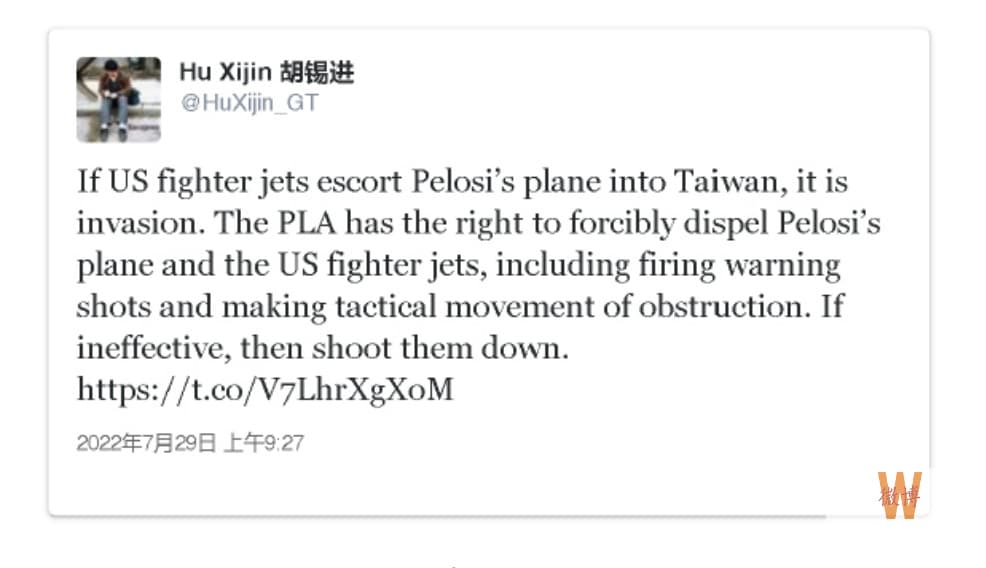She is called ‘the American Old Lady’ and ‘the Old Witch’ on Chinese social media. Nancy Pelosi, or Pèiluòxī (佩洛西), is all the talk on Weibo this week since reports came out that the U.S. House Speaker is planning a visit to Taiwan.
It is the second time this year a potential Pelosi Taiwan trip raises U.S.-China tensions. Earlier this year, there were also reports that Pelosi would lead a delegation to visit Taiwan on April 10. But just days before, on April 7, news came out that Pelosi had tested positive for Covid-19 and her Asia trip was postponed.
In July 2022, although not officially announced, reports again came out that Pelosi might visit Taiwan during her rescheduled Asia trip, during which she is planned to visit Singapore, Malaysia, South Korea, and Japan (no mention of Taiwan as of July 31st). If she would also land in Taiwan, she would be the first House speaker to visit Taiwan in 25 years.
There have been several hashtag pages on Weibo dedicated to the topic of Pelosi’s alleged Taiwan visit. One of the hashtags popping up on Chinese social media on July 25 was “Pelosi Visiting Taiwan” (#佩洛西访台#). By July 30, there was the CCTV-initiated hashtag “If Pelosi Visits Taiwan, China’s Military Will Not Sit Back and Watch” (#若佩洛西访台中国军队绝不会坐视不管#).
On the same day, there was the Global Times-initiated hashtag “Trump Slams Pelosi’s Possible Visit to Taiwan” (#特朗普抨击佩洛西可能访台#), and “If Pelosi’s Visit Happens, Mainland Will Take Decisive Taiwan Measures” (#佩洛西若窜访成行大陆将对台采取断然措施#), hosted by the official account of the Chinese People’s Political Consultative Conference (CPPCC). And then there was the “Geng Shuang Says Involved Countries Should Not Play With Fire” hashtag (#耿爽说有关国家不要玩火自焚#), referring to an address by China’s deputy permanent representative to the UN. On July 29, Geng Shuang highlighted the apparent hypocrisy of individual countries repeatedly stressing the principle of sovereignty when it comes to Ukraine, while challenging China’s sovereignty when it comes to the Taiwan issue – and in doing so, “deliberately creating tensions.”
On Sunday, the hashtags “Pelosi” and “Pelosi Sends Our Four Messages without Mentioning Taiwan” (#佩洛西发文4条没提台湾#) (referring to these tweets by Pelosi) both went trending, receiving 110 and 270 million views respectively within one day.
What would Pelosi’s potential visit to Taiwan mean to mainland China? Chinese state media outlets are clear about China’s official stance. China Daily (Global Edition) headlined “Xi: No Room for interference on Taiwan question” on its newspaper frontpage on Friday. The English-language Global Times published a statement via Twitter, saying: “We have ways to raise the risk of Pelosi’s “performance” through the visit, greatly increase the cost of her performance, and boost the price she has to pay. Let Pelosi deeply realize that Taiwan island is not a place where she can run wild.”

In light of a two-hour telephone conversation between President Xi Jinping and President Joe Biden on July 28, there were also some softer stances. The Chinese-language People’s Daily published an article suggesting that Sino-American relations should focus on strengthening communication to avoid misunderstandings and promote further cooperation between the two countries.
Meanwhile, there are many netizens and bigger bloggers discussing this issue on Chinese social media. Combing out all the posts on Pelosi flooding Weibo these days, there seem to be three main views shared by the majority, which we will further detail below.
VIEW 1: PELOSI’S VISIT MEANS THE U.S. SUPPORTS TAIWAN INDEPENDENCE (AND THAT MEANS WAR)
A common stance on Chinese social media regarding Pelosi’s visit is that it would mean a U.S. recognition of Taiwan as an independent state, which is a direct provocation of mainland China.
One popular blogger (@封起De日子) writes:
“If Pelosi really visits Taiwan, it actually means the U.S. approves of Taiwan independence. Taiwan has then become de facto independent. Pelosi would be the third U.S. government person to do so, which is extraordinary. Taiwan is Chinese territory, and if we ignore such an undertaking, we would deny that foundation ourselves. This is a serious provocation. We have so far lacked a strong voice and statement, and the central government and the Central Military Commission and other departments should declare that Pelosi’s visit to Taiwan means a war provocation! If Pelosi’s plane enters China’s airspace and territorial waters of Taiwan, the armed forces of the Chinese People’s Liberation Army have the right to decisively shoot down (kill) it at any time! This position would be the right one for any sovereign country.”
Another commenter writes: “If Pelosi visits Taiwan in the next two days she’ll cause a war. If the country needs donations, I, as an ordinary Chinese citizen, am willing to donate to my country, and I would even be willing to sacrifice my life.”
“If a U.S. Army Aircraft dares to enter Taiwan, it is an invasion, and we can shoot it down,” an influential gaming blogger (@老刀99, over 2 million fans) also wrote.
This kind of reasoning follows that of the influential Global Times commentator Hu Xijin (@胡锡进), who suggested that a Taiwan visit by Pelosi would be a clear provocation, giving the People’s Liberation Army (PLA) “good reason” for “waging a war.”
One of Hu’s tweets, in which he voiced the view that U.S. military planes escorting Pelosi to Taiwan could potentially be shot down, was deleted from Twitter. He reported about this on his Weibo account.

Hu Xijin tweet which was deleted by Twitter on July 30.
In another post on July 31, Hu warned Taiwan leadership that by agreeing to a Pelosi visit and “seeking ‘international support,'” they are “forgetting that their fate is in the hands of the mainland.”
Some commenters said they actually hoped Pelosi would go to Taiwan in order to let the real conflict begin: “I hope Pelosi’s visit to Taiwan will succeed,” one Weibo user wrote: “These years, I’ve heard too many forced righteous words, I don’t know where our bottom line is anymore, I just see the non-stop favors, while they’re snickering and looking down on us. It’s no use when it’s all talk and no action and it’s ineffective to keep on crying wolf. Pelosi, come on!”
“If the day Pelosi visits Taiwan is the day we recover Taiwan, should we still prevent her from visiting?” another Weibo user wonders.
On July 28, Fujian’s Pingtan Maritime Safety Administration issued a navigation warning that there would be live-fire exercises on July 30 in the waters near Fujian, opposite Taiwan. On Weibo, the live-fire drill also became a topic of interest (#福建平潭部分海域实弹射击训练#), with many applauding the exercises.
“We must resolutely defend national sovereignty and defend our territorial integrity,” one commenter wrote.
VIEW 2: IT’S ALL JUST FOR SHOW (AND TAIWAN IS A POLITICAL PLAYFIELD)
Another view expressed on Chinese social media is that a potential Taiwan visit would be just for show, and that neither Pelosi nor the U.S. truly have Taiwan’s best interests at heart.
According to some, a visit to Taiwan would be nothing more than a political “fashion show” for Pelosi, since this might be the last big Asia trip for the 82-year-old politician. “It’s just a superficial performance,” one military blogger wrote. There are more people agreeing with this stance. “This is to show off her courage and guts as a way to end her term of office,” author Zhang Huilin writes (over 2M followers @张慧林).
Others also suggest that China would not start a war over such a move. Keluo Liaofu (@科罗廖夫), an author on military affairs with over 6 million fans, writes:
“If Pelosi really visits Taiwan, the mainland will certainly be furious, and there will be fierce retaliation, including military-diplomatic and economic retaliation such as halting certain Sino-American cooperations, expulsion of diplomats, and other punitive sanctions. Then, as things go, this will be forgotten after a few months.”
Another blogger describes Taiwan as a political play field, literally a ‘chessboard’, that is used by the big ‘chess players’ – China and the United States – who are also surrounded by other supporting players. Taiwan is just a “gambit” and it is not about Taiwan itself, the blogger suggests: the Taiwan issue is just a strategy for the U.S. to “suppress China” and the moves made by both the U.S. and China regarding Taiwan are ways to test out each other’s “red lines.”
“It’s all just bluff. She won’t even dare to visit,” another person writes.
VIEW 3: U.S.-CHINA RELATIONS ARE ALREADY BAD REGARDLESS IF SHE VISITS OR NOT (AND THINGS WILL NOT CHANGE)
Another view on the potential Taiwan visit is that whether Pelosi actually visits or not, reports about the trip have already brought China-U.S. relations to a new low point.
“Regardless of whether Pelosi visits Taiwan in whatever way, the political basis for U.S.-China relations is already severely broken, [because] it means that the national will of the United States does not take [our] relationship seriously at all,” one Weibo blogger writes: “No need to harbour any illusions.”
Some netizens express that China always has to be the ‘reasonable voice’ that is ignored by an obstinate and provocative America.
Weibo vlogger Yuanzhezhi (@袁者之) writes:
“As just one web user, and as a Chinese, I would like to express my personal voice. The U.S. side should stop obstinately persisting in making things go the wrong way, to insist on creating global unrest. Can they only be happy when there are regional tensions? If Pelosi ignores the voice of the Chinese, the consequences and responsibilities will be borne by the U.S. side. I hope that the U.S. can listen to some of the domestic and international voices of reason, and that they can stop obsessively making the same mistakes over and over again, resulting in an irreversible situation, moving further and further away from the U.S.-China relationship!”
Another popular educational blogger (@才疏学浅柏拉图, over 1M fans) writes:
“My guess is that America is not prepared, and that we’re not prepared enough either. But our public opinion is already shaped and fixed in place. It makes me think of how Zhuge Liang used the empty city to scare Sima Yi (t/n: reference to ‘Empty Fort Strategy‘, reverse psychology to scare the enemy). Maybe the American Old Lady ends up going to a third-party location where she’ll invite Taiwan leadership, so she can express the American support [for Taiwan] without making us lose face, but the struggle between the U.S. and China remains the same.”
Just before Sunday midnight, news blogger Dayue Chuqing (@大越楚卿) asked his followers what the motive might be for Pelose to visit Taiwan.
While some say she is doing for herself and others suggest it’s U.S. power politics, there are also those who consider an entirely different motive: “Maybe she just really feels like eating Taiwanese cuisine.”
To read more of our articles on Sino-US relations, click here.
By Manya Koetse
Get the story behind the hashtag. Subscribe to What’s on Weibo here to receive our weekly newsletter and get access to our latest articles:
Spotted a mistake or want to add something? Please let us know in comments below or email us. First-time commenters, please be patient – we will have to manually approve your comment before it appears.
©2022 Whatsonweibo. All rights reserved. Do not reproduce our content without permission – you can contact us at info@whatsonweibo.com.
The post From ‘Starting a War’ to ‘Just for Show’: Chinese Social Media Views on Pelosi’s Potential Taiwan Visit appeared first on What's on Weibo.